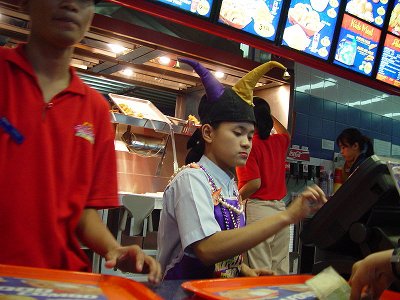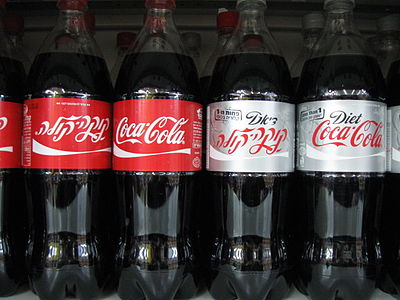3.1: Introduction to Globalization, Modernization and Development
- Last updated
-
-
Save as PDF

Figure \(\PageIndex{1}\) - Mall culture in Jakarta
We talk about globalization today as if it’s some great big new thing that we’ve all just discovered. But there’s really nothing new about it.
~ Jacqueline Winspear

Figure \(\PageIndex{2}\) - English and Hebrew Coke labels.
In this section, we will skim the surface of globalization with a particular emphasis of the history of modern era of globalization and its effects on indigenous peoples. Modern economic and political development is driven by the assumption that modernization and development will be beneficial for all people; however, cultural differences are not taken into consideration, often leading to the destruction of indigenous cultures. Understanding the context of modern development enables us to understand our own place in an increasingly interconnected world.
Start with this TedTalk video of Wade Davis, anthropologist in residence at the National Geographic Society, speaking about endangered cultures [run time: 22.04].
What is globalization?
The answer to this question is not a simple one. There are various definitions of globalization depending on the perspective with which the topic is approached. Many think of globalization as processes that cause changes that make people more interconnected and interdependent. Others think of it as “…a reorganization of time and space in which many movements of peoples, things, and ideas throughout much of the world have become increasingly faster and effortless (Morris 2010: 865). Still others focus on the interaction and integration promoted by international trade, investment, and information technology (The Levin Institute 2015). Anthropologists acknowledge that all of these definitions are relevant to the study of globalization and use long-term ethnographic studies to understand the dynamics of globalization. One of the things that make anthropological research on globalization important is that it remains focused on the impact of these global processes on individuals and cultures. Anthropologists do not assume that globalization is “natural and unavoidable” as that approach is steeped in Social Darwinist ideology and obscures how power and privilege are constructed and maintained (Morris 2010). It is an experiential process, meaning that it is different for each person. In an anthropological sense, globalization is “…an intensification of global interconnectedness, suggesting a world full of movement and mixture, contact and linkages, and persistent cultural interaction and exchange” (Inda and Rosaldo 2002: 2).
Enmeshed in the concept of globalization are modernization, development, and the legacy of European colonialism.




